Презентация ch01 Nature of International Marketing

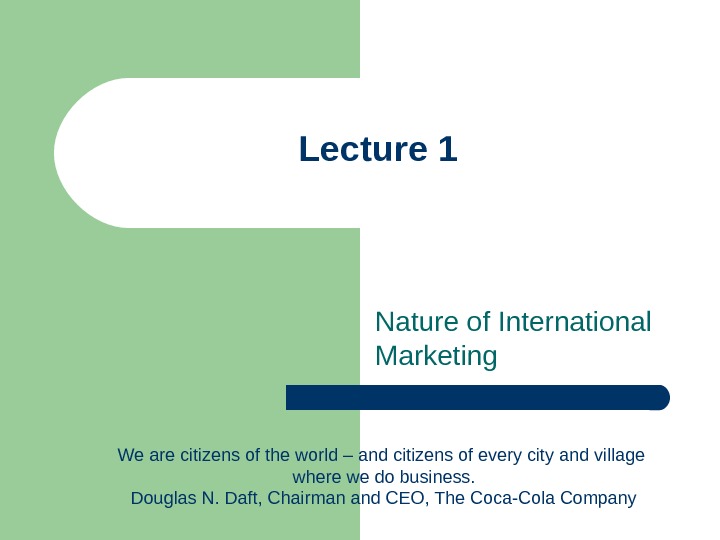
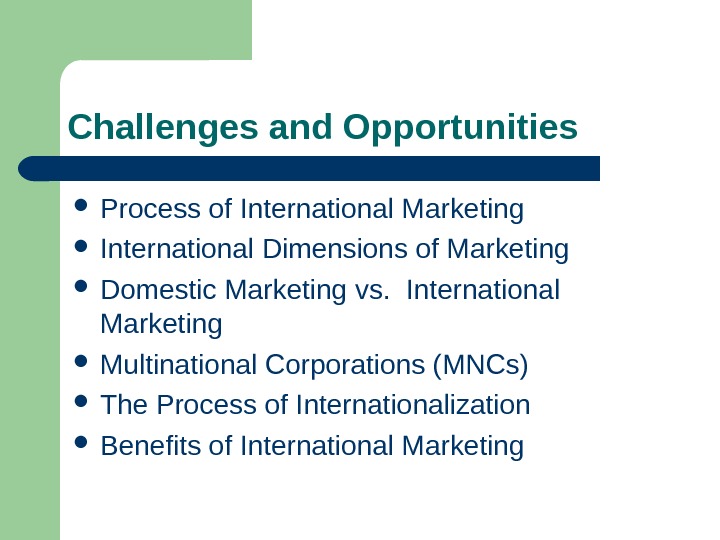

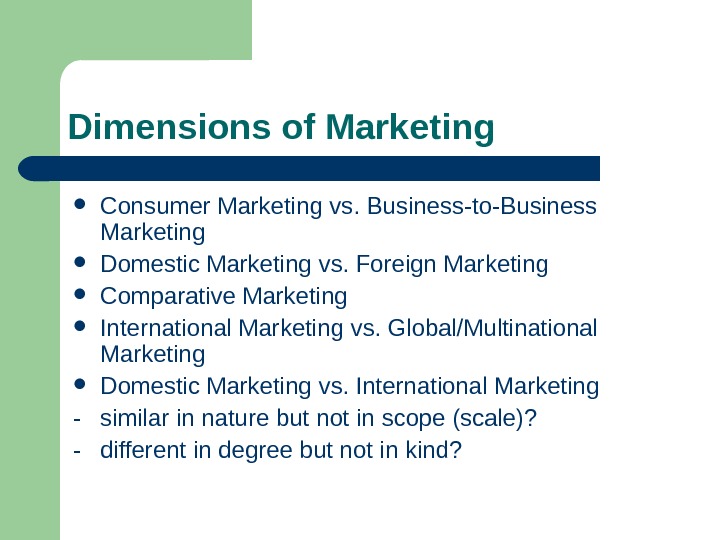
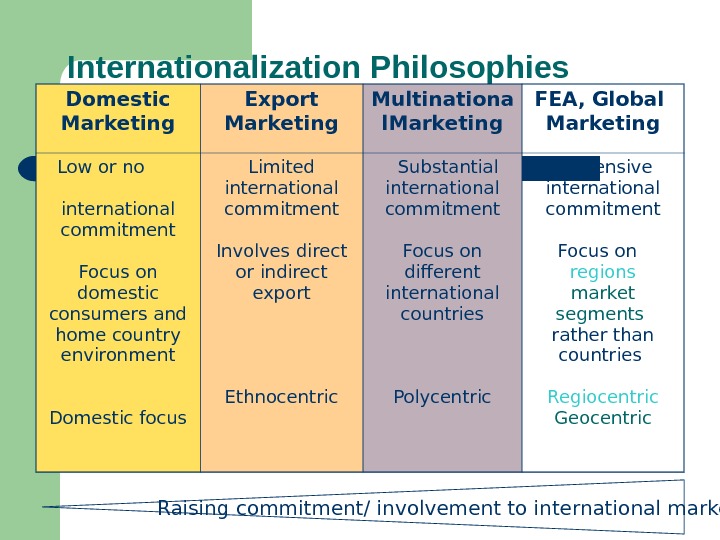
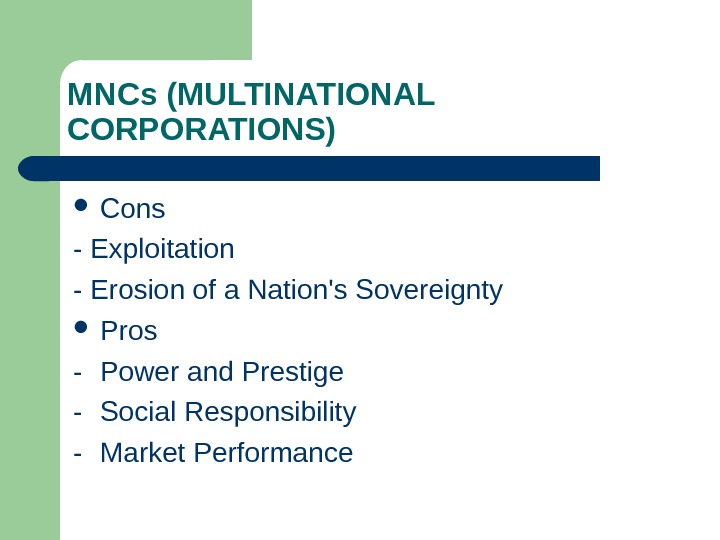
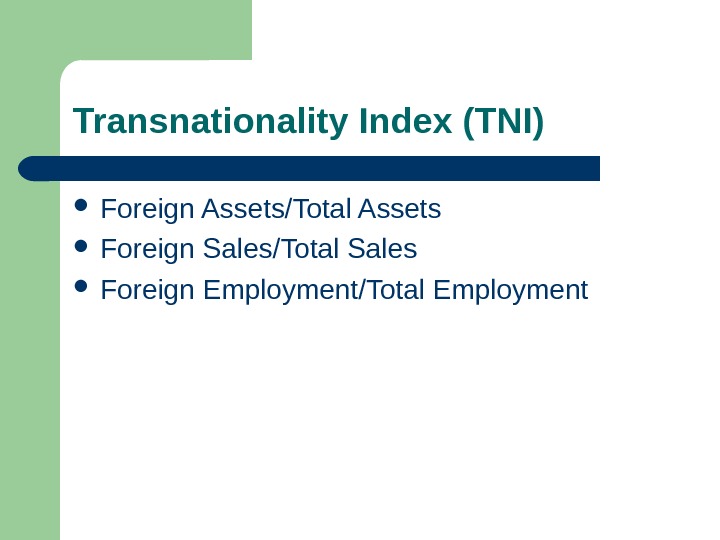

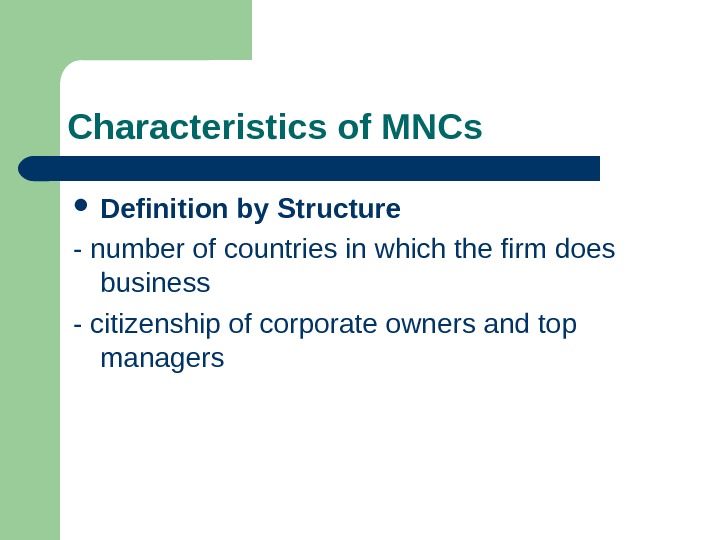

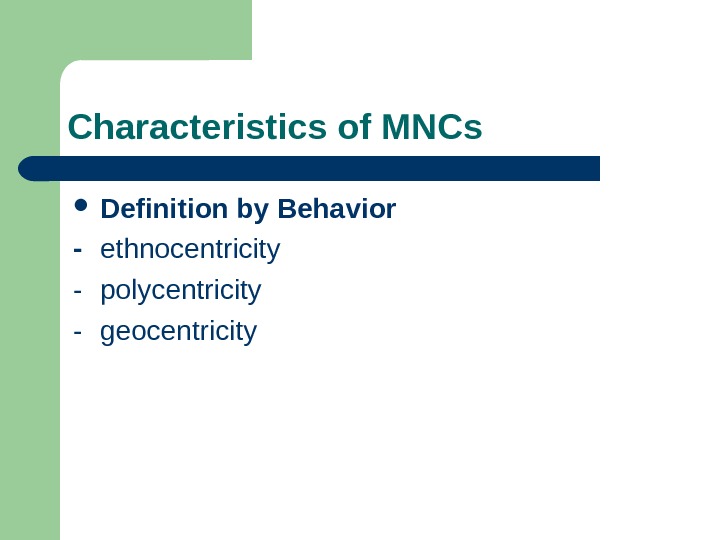




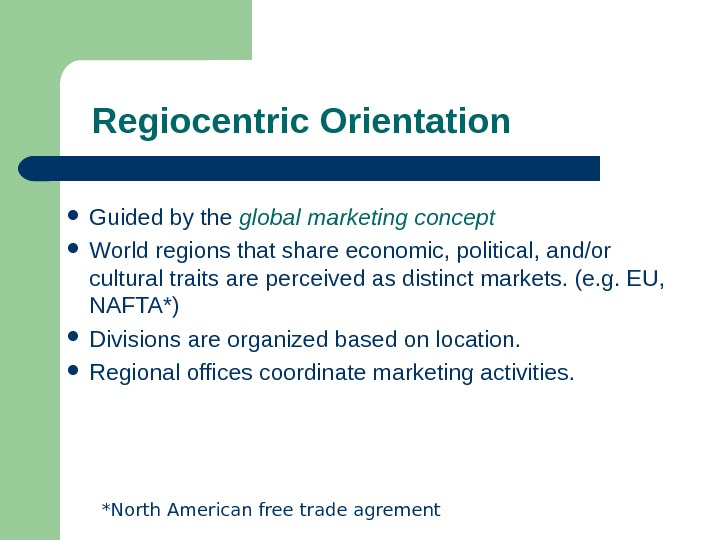
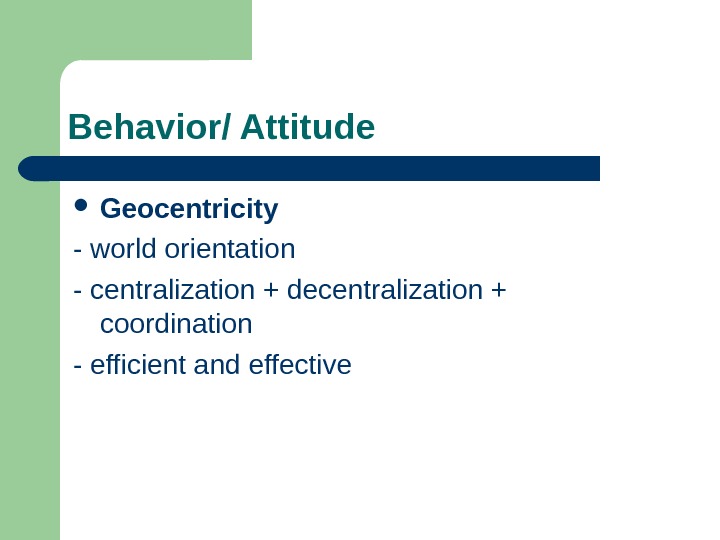
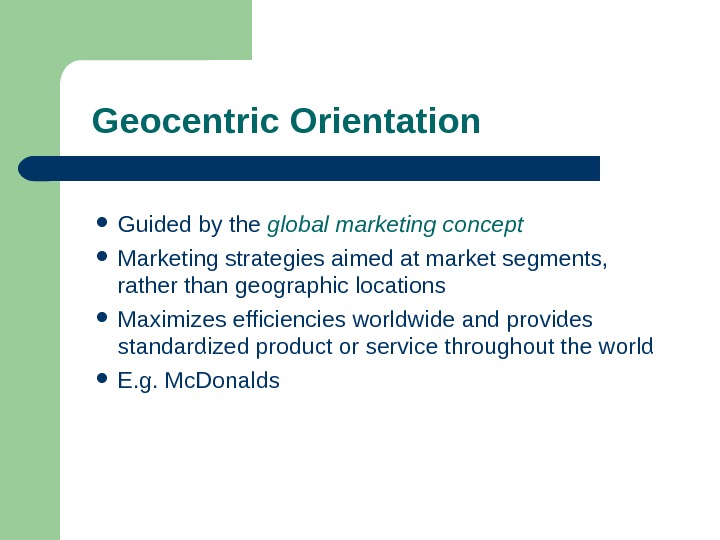
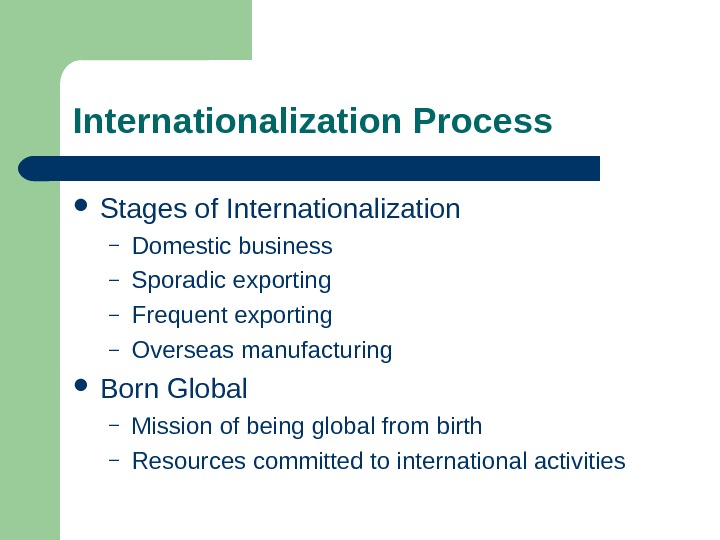
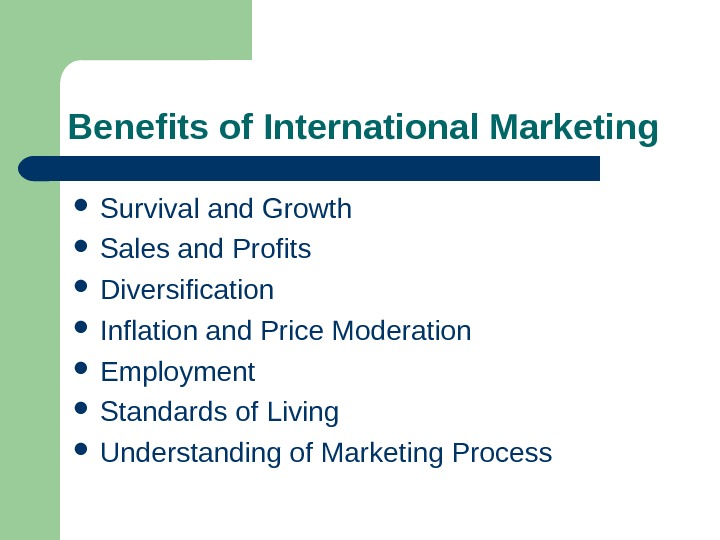
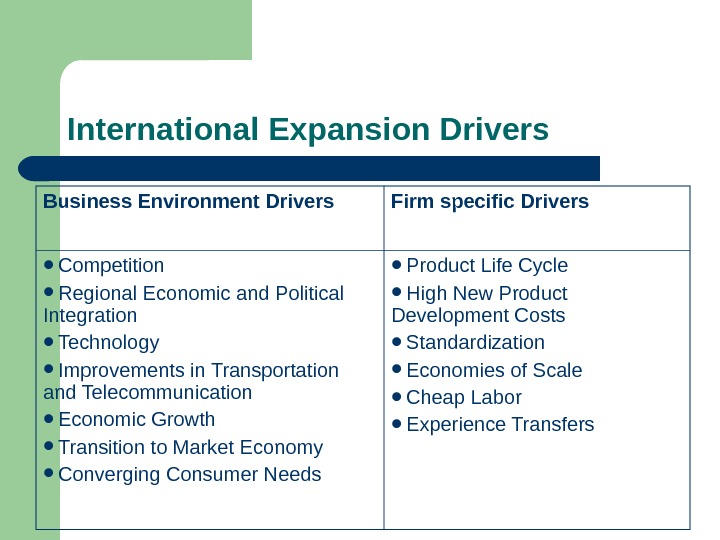
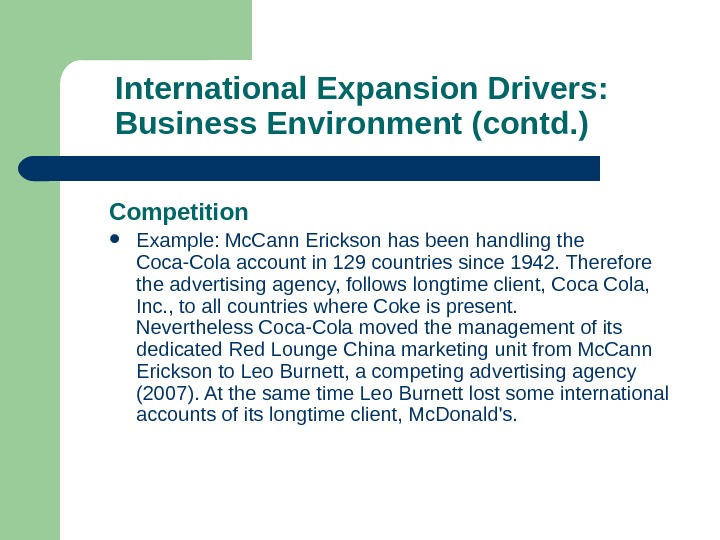
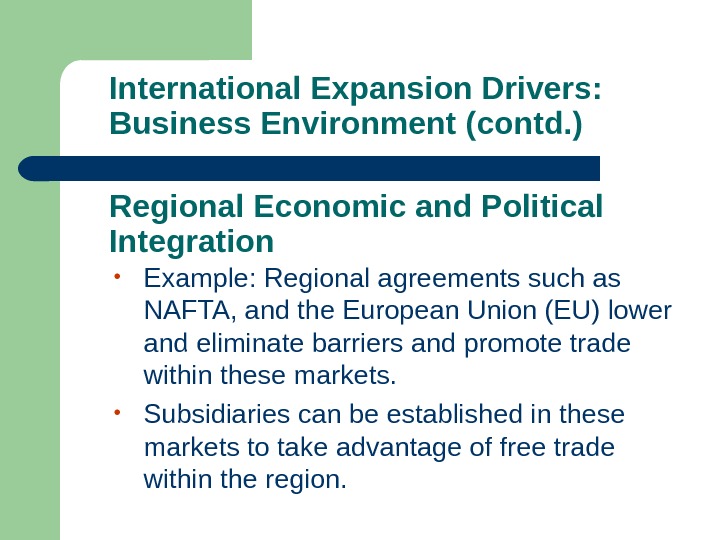

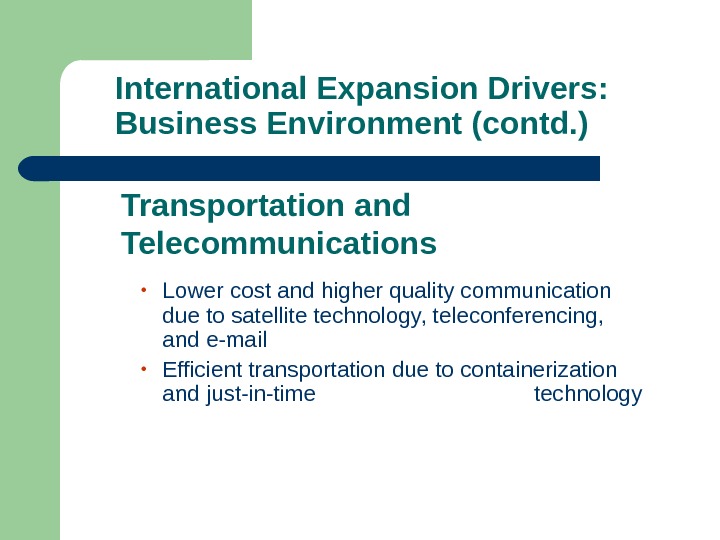
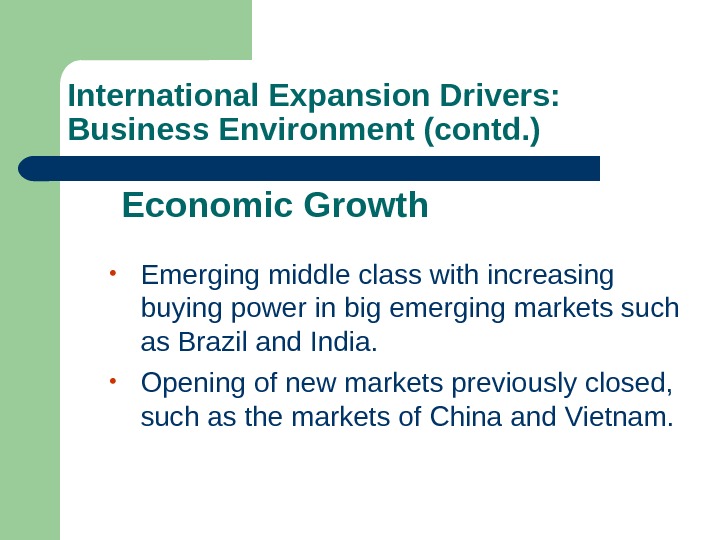
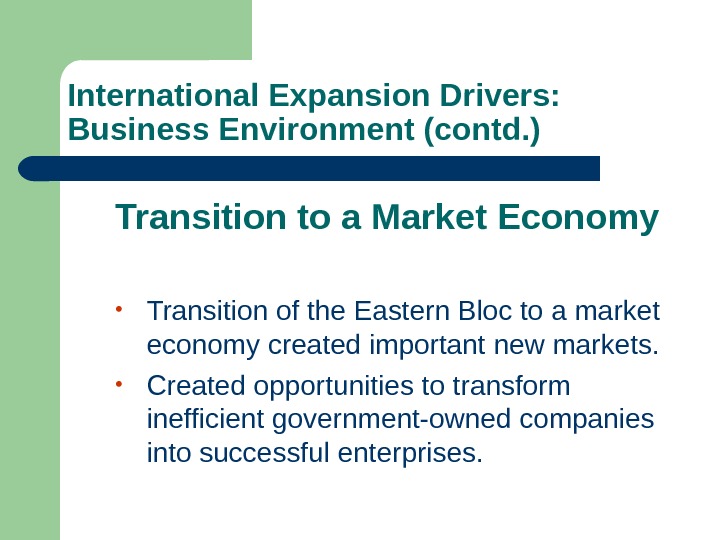

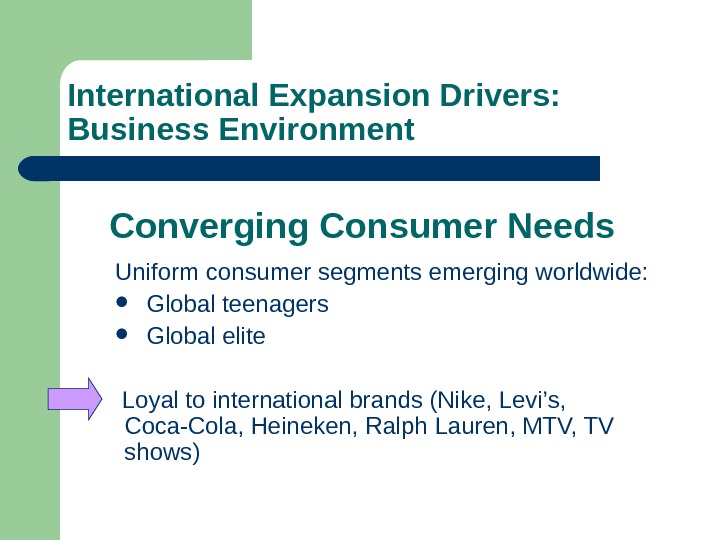

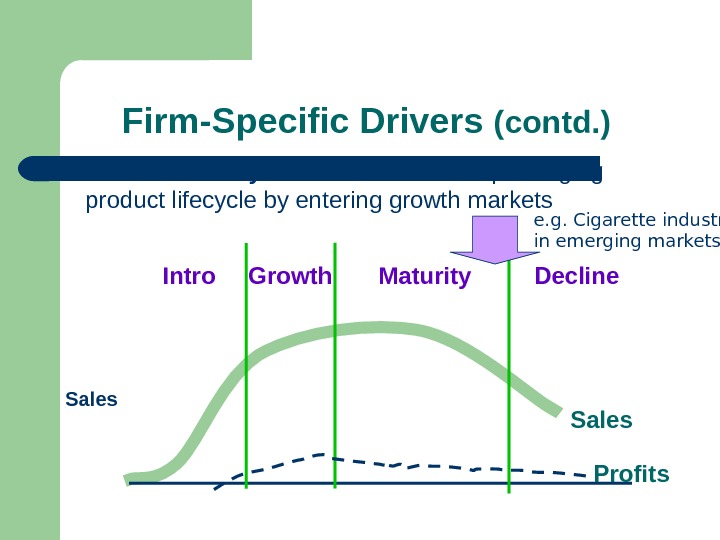

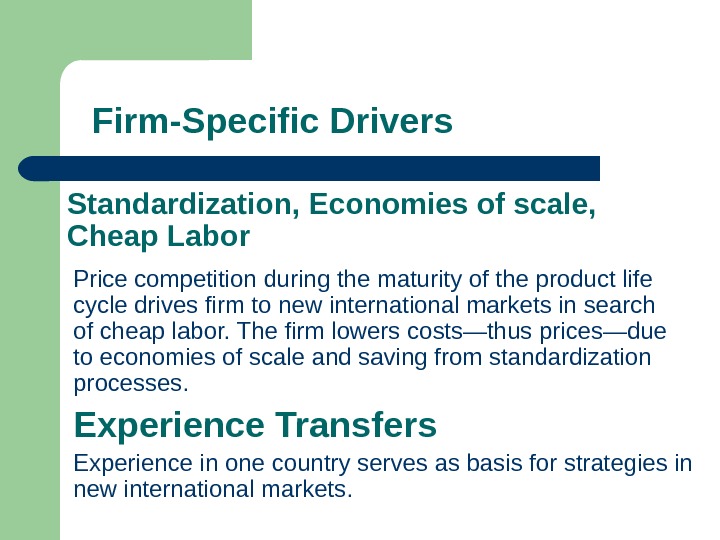




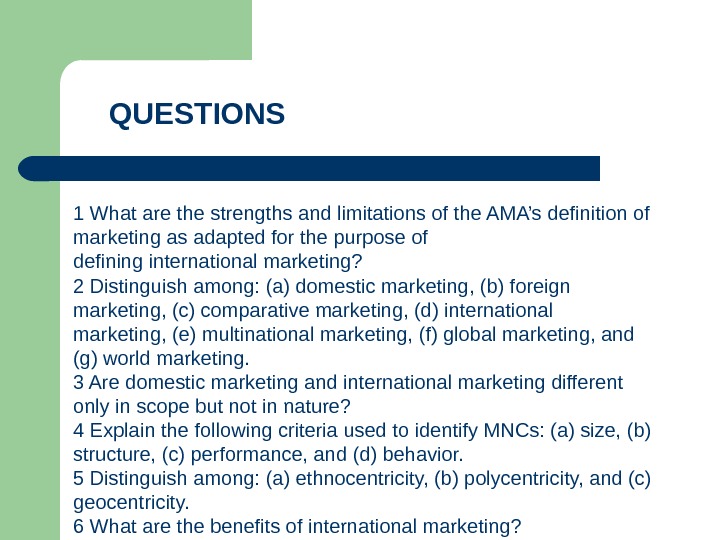
ch01_nature_of_international_marketing.ppt
- Размер: 254.5 Кб
- Количество слайдов: 38
Описание презентации Презентация ch01 Nature of International Marketing по слайдам
 Lecture 1 Nature of International Marketing We are citizens of the world – and citizens of every city and village where we do business. Douglas N. Daft, Chairman and CEO, The Coca-Cola Company
Lecture 1 Nature of International Marketing We are citizens of the world – and citizens of every city and village where we do business. Douglas N. Daft, Chairman and CEO, The Coca-Cola Company
 Challenges and Opportunities Process of International Marketing International Dimensions of Marketing Domestic Marketing vs. International Marketing Multinational Corporations (MNCs) The Process of Internationalization Benefits of International Marketing
Challenges and Opportunities Process of International Marketing International Dimensions of Marketing Domestic Marketing vs. International Marketing Multinational Corporations (MNCs) The Process of Internationalization Benefits of International Marketing
 Definition of FEA Marketing Multinational process of planning and executing the conception, pricing, promotion, and distribution of ideas, goods, and services and to create exchanges that satisfy individual and organizational objectives
Definition of FEA Marketing Multinational process of planning and executing the conception, pricing, promotion, and distribution of ideas, goods, and services and to create exchanges that satisfy individual and organizational objectives
 Dimensions of Marketing Consumer Marketing vs. Business-to-Business Marketing Domestic Marketing vs. Foreign Marketing Comparative Marketing International Marketing vs. Global/Multinational Marketing Domestic Marketing vs. International Marketing — similar in nature but not in scope (scale)? — different in degree but not in kind?
Dimensions of Marketing Consumer Marketing vs. Business-to-Business Marketing Domestic Marketing vs. Foreign Marketing Comparative Marketing International Marketing vs. Global/Multinational Marketing Domestic Marketing vs. International Marketing — similar in nature but not in scope (scale)? — different in degree but not in kind?
 Internationalization Philosophies Domestic Marketing Export Marketing Multinationa l. Marketing FEA, Global Marketing Low or no international commitment Focus on domestic consumers and home country environment Domestic focus Limited international commitment Involves direct or indirect export Ethnocentric Substantial international commitment Focus on different international countries Polycentric Extensive international commitment Focus on regions market segments rather than countries Regiocentric Geocentric Raising commitment/ involvement to international markets
Internationalization Philosophies Domestic Marketing Export Marketing Multinationa l. Marketing FEA, Global Marketing Low or no international commitment Focus on domestic consumers and home country environment Domestic focus Limited international commitment Involves direct or indirect export Ethnocentric Substantial international commitment Focus on different international countries Polycentric Extensive international commitment Focus on regions market segments rather than countries Regiocentric Geocentric Raising commitment/ involvement to international markets
 MNCs (MULTINATIONAL CORPORATIONS) Cons — Exploitation — Erosion of a Nation’s Sovereignty Pros — Power and Prestige — Social Responsibility — Market Performance
MNCs (MULTINATIONAL CORPORATIONS) Cons — Exploitation — Erosion of a Nation’s Sovereignty Pros — Power and Prestige — Social Responsibility — Market Performance
 Transnationality Index (TNI) Foreign Assets/Total Assets Foreign Sales/Total Sales Foreign Employment/Total Employment
Transnationality Index (TNI) Foreign Assets/Total Assets Foreign Sales/Total Sales Foreign Employment/Total Employment
 Characteristics of MNCs Definition by Size — market value — sales — profits — assets — number of employees
Characteristics of MNCs Definition by Size — market value — sales — profits — assets — number of employees
 Characteristics of MNCs Definition by Structure — number of countries in which the firm does business — citizenship of corporate owners and top managers
Characteristics of MNCs Definition by Structure — number of countries in which the firm does business — citizenship of corporate owners and top managers
 Characteristics of MNCs Definition by Performance — commitment of corporate resources to foreign operations — amount of rewards from that commitment
Characteristics of MNCs Definition by Performance — commitment of corporate resources to foreign operations — amount of rewards from that commitment
 Characteristics of MNCs Definition by Behavior — ethnocentricity — polycentricity — geocentricity
Characteristics of MNCs Definition by Behavior — ethnocentricity — polycentricity — geocentricity
 Behavior/ Attitude Ethnocentricity — orientation toward home country — centralization of decision making — efficient but not effective
Behavior/ Attitude Ethnocentricity — orientation toward home country — centralization of decision making — efficient but not effective
 Ethnocentric Orientation Guided by domestic market extension concept Domestic strategies, techniques, and personnel are perceived as superior. International markets are secondary, regarded primarily as outlets for surplus domestic production. International marketing plans are developed in-house by the international division. E. g. Disney resort in France: Disneyland Resort Paris had to adapt it to local preferences: European fairy tales, food, and dress code for staff.
Ethnocentric Orientation Guided by domestic market extension concept Domestic strategies, techniques, and personnel are perceived as superior. International markets are secondary, regarded primarily as outlets for surplus domestic production. International marketing plans are developed in-house by the international division. E. g. Disney resort in France: Disneyland Resort Paris had to adapt it to local preferences: European fairy tales, food, and dress code for staff.
 Behavior/ Attitude Polycentricity — strong orientation to host country — decentralization of decision making — effective but not efficient
Behavior/ Attitude Polycentricity — strong orientation to host country — decentralization of decision making — effective but not efficient
 Polycentric Orientation Guided by the multidomestic marketing concept Focuses on the importance and uniqueness of each international market Firms establish independent businesses in each target country. Fully decentralized, minimal coordination with headquarters Marketing strategies are specific to each country. Outcomes: – No economies of scale – Duplicated functions – Higher final product costs
Polycentric Orientation Guided by the multidomestic marketing concept Focuses on the importance and uniqueness of each international market Firms establish independent businesses in each target country. Fully decentralized, minimal coordination with headquarters Marketing strategies are specific to each country. Outcomes: – No economies of scale – Duplicated functions – Higher final product costs
 Regiocentric Orientation Guided by the global marketing concept World regions that share economic, political, and/or cultural traits are perceived as distinct markets. (e. g. EU, NAFTA*) Divisions are organized based on location. Regional offices coordinate marketing activities. *North American free trade agrement
Regiocentric Orientation Guided by the global marketing concept World regions that share economic, political, and/or cultural traits are perceived as distinct markets. (e. g. EU, NAFTA*) Divisions are organized based on location. Regional offices coordinate marketing activities. *North American free trade agrement
 Behavior/ Attitude Geocentricity — world orientation — centralization + decentralization + coordination — efficient and effective
Behavior/ Attitude Geocentricity — world orientation — centralization + decentralization + coordination — efficient and effective
 Geocentric Orientation Guided by the global marketing concept Marketing strategies aimed at market segments, rather than geographic locations Maximizes efficiencies worldwide and provides standardized product or service throughout the world E. g. Mc. Donalds
Geocentric Orientation Guided by the global marketing concept Marketing strategies aimed at market segments, rather than geographic locations Maximizes efficiencies worldwide and provides standardized product or service throughout the world E. g. Mc. Donalds
 Internationalization Process Stages of Internationalization – Domestic business – Sporadic exporting – Frequent exporting – Overseas manufacturing Born Global – Mission of being global from birth – Resources committed to international activities
Internationalization Process Stages of Internationalization – Domestic business – Sporadic exporting – Frequent exporting – Overseas manufacturing Born Global – Mission of being global from birth – Resources committed to international activities
 Benefits of International Marketing Survival and Growth Sales and Profits Diversification Inflation and Price Moderation Employment Standards of Living Understanding of Marketing Process
Benefits of International Marketing Survival and Growth Sales and Profits Diversification Inflation and Price Moderation Employment Standards of Living Understanding of Marketing Process
 International Expansion Drivers Business Environment Drivers Firm specific Drivers Competition Regional Economic and Political Integration Technology Improvements in Transportation and Telecommunication Economic Growth Transition to Market Economy Converging Consumer Needs Product Life Cycle High New Product Development Costs Standardization Economies of Scale Cheap Labor Experience Transfers
International Expansion Drivers Business Environment Drivers Firm specific Drivers Competition Regional Economic and Political Integration Technology Improvements in Transportation and Telecommunication Economic Growth Transition to Market Economy Converging Consumer Needs Product Life Cycle High New Product Development Costs Standardization Economies of Scale Cheap Labor Experience Transfers
 International Expansion Drivers: Business Environment (contd. ) Competition Example: Mc. Cann Erickson has been handling the Coca-Cola account in 129 countries since 1942. Therefore the advertising agency, follows longtime client, Coca Cola, Inc. , to all countries where Coke is present. Nevertheless Coca-Cola moved the management of its dedicated Red Lounge China marketing unit from Mc. Cann Erickson to Leo Burnett, a competing advertising agency (2007). At the same time Leo Burnett lost some international accounts of its longtime client, Mc. Donald’s.
International Expansion Drivers: Business Environment (contd. ) Competition Example: Mc. Cann Erickson has been handling the Coca-Cola account in 129 countries since 1942. Therefore the advertising agency, follows longtime client, Coca Cola, Inc. , to all countries where Coke is present. Nevertheless Coca-Cola moved the management of its dedicated Red Lounge China marketing unit from Mc. Cann Erickson to Leo Burnett, a competing advertising agency (2007). At the same time Leo Burnett lost some international accounts of its longtime client, Mc. Donald’s.
 International Expansion Drivers: Business Environment (contd. ) • Example: Regional agreements such as NAFTA, and the European Union (EU) lower and eliminate barriers and promote trade within these markets. • Subsidiaries can be established in these markets to take advantage of free trade within the region. Regional Economic and Political Integration
International Expansion Drivers: Business Environment (contd. ) • Example: Regional agreements such as NAFTA, and the European Union (EU) lower and eliminate barriers and promote trade within these markets. • Subsidiaries can be established in these markets to take advantage of free trade within the region. Regional Economic and Political Integration
 International Expansion Drivers: Business Environment (contd. ) Technology Examples: Consumers worldwide are exposed to similar products, services, and entertainment, and marketing communications. The Web and the Internet have revolutionized the way companies conduct business.
International Expansion Drivers: Business Environment (contd. ) Technology Examples: Consumers worldwide are exposed to similar products, services, and entertainment, and marketing communications. The Web and the Internet have revolutionized the way companies conduct business.
 International Expansion Drivers: Business Environment (contd. ) • Lower cost and higher quality communication due to satellite technology, teleconferencing, and e-mail • Efficient transportation due to containerization and just-in-time technology. Transportation and Telecommunications
International Expansion Drivers: Business Environment (contd. ) • Lower cost and higher quality communication due to satellite technology, teleconferencing, and e-mail • Efficient transportation due to containerization and just-in-time technology. Transportation and Telecommunications
 • Emerging middle class with increasing buying power in big emerging markets such as Brazil and India. • Opening of new markets previously closed, such as the markets of China and Vietnam. Economic Growth. International Expansion Drivers: Business Environment (contd. )
• Emerging middle class with increasing buying power in big emerging markets such as Brazil and India. • Opening of new markets previously closed, such as the markets of China and Vietnam. Economic Growth. International Expansion Drivers: Business Environment (contd. )
 • Transition of the Eastern Bloc to a market economy created important new markets. • Created opportunities to transform inefficient government-owned companies into successful enterprises. Transition to a Market Economy. International Expansion Drivers: Business Environment (contd. )
• Transition of the Eastern Bloc to a market economy created important new markets. • Created opportunities to transform inefficient government-owned companies into successful enterprises. Transition to a Market Economy. International Expansion Drivers: Business Environment (contd. )
 International Expansion Drivers: Business Environment (contd. ) Transition to a Market Economy Yum! Brands in China and Taiwan (e. g. Taco Bell, KFC, Pizza Hut) do well — in spite of E. coli (East cost) and rat infestation in NY Yum! Brands is omnipresent in China and Taiwan
International Expansion Drivers: Business Environment (contd. ) Transition to a Market Economy Yum! Brands in China and Taiwan (e. g. Taco Bell, KFC, Pizza Hut) do well — in spite of E. coli (East cost) and rat infestation in NY Yum! Brands is omnipresent in China and Taiwan
 Uniform consumer segments emerging worldwide: Global teenagers Global elite Loyal to international brands (Nike, Levi’s, Coca-Cola, Heineken, Ralph Lauren, MTV, TV shows)Converging Consumer Needs. International Expansion Drivers: Business Environment
Uniform consumer segments emerging worldwide: Global teenagers Global elite Loyal to international brands (Nike, Levi’s, Coca-Cola, Heineken, Ralph Lauren, MTV, TV shows)Converging Consumer Needs. International Expansion Drivers: Business Environment
 Consumers traveling abroad bring with them product experiences and demand brands that may not be available in the home-country market. Converging Consumer Needs. International Expansion Drivers: Business Environment Bagel shop in Berlin (Potsdamer Platz)
Consumers traveling abroad bring with them product experiences and demand brands that may not be available in the home-country market. Converging Consumer Needs. International Expansion Drivers: Business Environment Bagel shop in Berlin (Potsdamer Platz)
 Firm-Specific Drivers (contd. ) Product Life Cycle Considerations: prolonging product lifecycle by entering growth markets Sales Intro Growth Maturity Decline Profits. Salese. g. Cigarette industry in emerging markets
Firm-Specific Drivers (contd. ) Product Life Cycle Considerations: prolonging product lifecycle by entering growth markets Sales Intro Growth Maturity Decline Profits. Salese. g. Cigarette industry in emerging markets
 Firm-Specific Drivers (contd) High New Product Development Costs Firm must look beyond home-country market to recover investment costs. E. g. Nike: one year to develop a new product, that last only half a year on the shelves in the US
Firm-Specific Drivers (contd) High New Product Development Costs Firm must look beyond home-country market to recover investment costs. E. g. Nike: one year to develop a new product, that last only half a year on the shelves in the US
 Price competition during the maturity of the product life cycle drives firm to new international markets in search of cheap labor. The firm lowers costs—thus prices—due to economies of scale and saving from standardization processes. Firm-Specific Drivers Standardization, Economies of scale, Cheap Labor Experience Transfers Experience in one country serves as basis for strategies in new international markets.
Price competition during the maturity of the product life cycle drives firm to new international markets in search of cheap labor. The firm lowers costs—thus prices—due to economies of scale and saving from standardization processes. Firm-Specific Drivers Standardization, Economies of scale, Cheap Labor Experience Transfers Experience in one country serves as basis for strategies in new international markets.
 Obstacles to Internationalization within the company outside Finances Psychological: unknown environment Self-Reference Criterion Government Barriers imposed by International Competition
Obstacles to Internationalization within the company outside Finances Psychological: unknown environment Self-Reference Criterion Government Barriers imposed by International Competition
 Obstacles to Internationalization Self-Reference Criterion Conscious and unconscious reference to own national culture while operating in the host country. (e. g. eye contact US-Japan) To counter the impact of the self-reference criterion, the corporation must select appropriate personnel for international assignments and engage in sensitivity training.
Obstacles to Internationalization Self-Reference Criterion Conscious and unconscious reference to own national culture while operating in the host country. (e. g. eye contact US-Japan) To counter the impact of the self-reference criterion, the corporation must select appropriate personnel for international assignments and engage in sensitivity training.
 Obstacles to Internationalization Government Barriers Restriction placed on foreign corporations by imposing tariffs, import quotas and other limitations, such as restrictive import license awards.
Obstacles to Internationalization Government Barriers Restriction placed on foreign corporations by imposing tariffs, import quotas and other limitations, such as restrictive import license awards.
 Obstacles to Internationalization Barriers imposed by International Competition Blocked channels of distribution Exclusive retailer agreements Cutting prices Advertising blitzes
Obstacles to Internationalization Barriers imposed by International Competition Blocked channels of distribution Exclusive retailer agreements Cutting prices Advertising blitzes
 1 What are the strengths and limitations of the AMA’s definition of marketing as adapted for the purpose of defining international marketing? 2 Distinguish among: (a) domestic marketing, (b) foreign marketing, (c) comparative marketing, (d) international marketing, (e) multinational marketing, (f) global marketing, and (g) world marketing. 3 Are domestic marketing and international marketing different only in scope but not in nature? 4 Explain the following criteria used to identify MNCs: (a) size, (b) structure, (c) performance, and (d) behavior. 5 Distinguish among: (a) ethnocentricity, (b) polycentricity, and (c) geocentricity. 6 What are the benefits of international marketing? QUESTIONS
1 What are the strengths and limitations of the AMA’s definition of marketing as adapted for the purpose of defining international marketing? 2 Distinguish among: (a) domestic marketing, (b) foreign marketing, (c) comparative marketing, (d) international marketing, (e) multinational marketing, (f) global marketing, and (g) world marketing. 3 Are domestic marketing and international marketing different only in scope but not in nature? 4 Explain the following criteria used to identify MNCs: (a) size, (b) structure, (c) performance, and (d) behavior. 5 Distinguish among: (a) ethnocentricity, (b) polycentricity, and (c) geocentricity. 6 What are the benefits of international marketing? QUESTIONS

